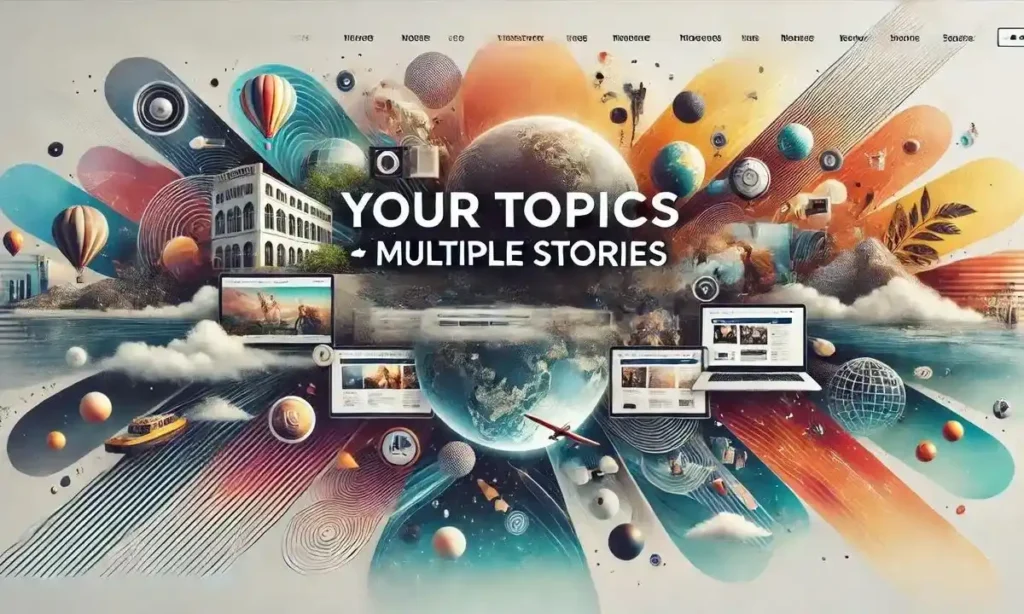Stories are the heartbeat of human culture. From ancient myths whispered around campfires to modern streaming epics, storytelling has always helped us understand ourselves and the world around us. Yet, one element often determines how a story unfolds — its genre.
Whether you’re crafting time travel adventures, romantic comedies, or supernatural thrillers, understanding genre is like understanding the rules of a new language. It shapes how your story feels, what emotions it evokes, and the journey your readers take.
This guide dives deep into why genre matters in storytelling, exploring seven major fiction types and offering unique, actionable story ideas for each. You’ll discover how to use genre as both a creative tool and a roadmap to inspire powerful storytelling.
Table of Contents
Why Genre Matters in Storytelling
Setting Reader Expectations
Every genre whispers a promise. When readers pick up a mystery novel, they expect clues, tension, and an eventual reveal. A fantasy story, on the other hand, promises escape — a journey through magical realms and mythical creatures.
Genre signals tone, structure, and mood. It helps readers instantly recognize whether they’re about to laugh, cry, or hide behind the couch.
| Genre | Primary Emotion Evoked | Reader Expectation |
|---|---|---|
| Mystery & Suspense | Curiosity, Anxiety | A secret or crime unraveled step by step |
| Fantasy Worlds | Wonder, Hope | Rich worldbuilding, epic quests |
| Science Fiction | Awe, Fear | Futuristic ideas and technology’s moral impact |
| Historical Fiction | Nostalgia, Empathy | Authentic past with emotional storytelling |
| Romantic Comedy | Joy, Warmth | Humor intertwined with love and self-growth |
| Supernatural Thriller | Fear, Intrigue | Paranormal danger and psychological tension |
| Time Travel Adventures | Fascination, Reflection | Exploration of time, choice, and destiny |
Readers crave the emotional rhythm of their favorite genres — and writers who understand that rhythm can deliver unforgettable stories.
Shaping Narrative Structure
Each genre has a different narrative heartbeat.
In romantic comedies, pacing often follows emotional beats — from attraction to misunderstanding, then reconciliation. In thrillers, it’s all about rising tension and explosive revelations.
Here’s a look at how genre impacts structure:
| Genre | Typical Story Structure | Key Plot Technique |
|---|---|---|
| Mystery | Setup → Investigation → Twist → Revelation | Red herrings, clues |
| Fantasy | Call to adventure → Conflict → Triumph | Hero’s journey |
| Science Fiction | Discovery → Conflict → Consequence | Speculative concept |
| Historical Fiction | Setting → Conflict → Transformation | Real-world parallels |
| Romantic Comedy | Meet-cute → Conflict → Resolution | Misunderstandings |
| Supernatural Thriller | Normalcy → Disturbance → Fear → Revelation | Supernatural reveal |
| Time Travel | Cause → Alteration → Paradox → Resolution | Butterfly effect |
Genre gives structure meaning. It defines where your twists belong, how characters evolve, and the emotional payoff your readers await.
Genre as a Creative Compass
Ironically, having boundaries makes writers more creative.
Knowing your genre’s “rules” lets you bend them intelligently — that’s where innovation thrives.
Take The Time Traveler’s Wife. It’s both science fiction and romance, proving how mixing genres can create emotional depth and market appeal.
“Good writing doesn’t imitate genre — it transforms it.”
— Adapted from Neil Gaiman’s storytelling philosophy
Genre is a compass, not a cage. Learn the directions, then chart your own path.
Time Travel Adventures: Twisting the Fabric of Time
The time travel genre is built on one powerful question: What if we could change the past?
It combines elements of science fiction, philosophy, and human emotion, challenging how we perceive cause, effect, and destiny.
Core Themes
- Temporal paradoxes and alternate timelines
- Regret, redemption, and moral choices
- The cost of changing history
Popular Examples
- “Back to the Future” – playful yet profound exploration of fate
- “11/22/63” by Stephen King – love and tragedy wrapped in historical alteration
Story Idea Examples
- The Ripple Effect: A physicist receives coded messages from his future self to prevent a world catastrophe.
- Shadows from the Past: A historian discovers an artifact that rewrites recorded history each time she touches it.
Writing Tip
Keep your time mechanics consistent. Create a visual timeline or use cause-and-effect charts to track paradoxes.
| Time Travel Type | Mechanism Example | Narrative Effect |
|---|---|---|
| Fixed Timeline | “Whatever happened, happened.” (12 Monkeys) | Creates fatalistic tone |
| Dynamic Timeline | Changes ripple through history (Back to the Future) | Creates tension and surprise |
| Multiverse Timeline | Every choice splits into a new reality (Avengers: Endgame) | Adds complexity and scope |
NLP & LSI keywords: time travel paradox, alternate timelines, butterfly effect, time machine, cause and consequence.
Mystery and Suspense: Keeping Readers Guessing
Few genres hook readers like a good mystery. It thrives on curiosity, uncertainty, and the thrill of discovery.
Essential Elements
- A compelling question or crime
- A protagonist (often flawed) pursuing the truth
- Red herrings and false leads
- Emotional stakes — what happens if the truth stays hidden?
Examples of Excellence
- “Gone Girl” – dual perspectives keep readers questioning motives.
- “Knives Out” – clever structure blending humor and suspense.
Story Idea Examples
- The Neighbor’s Secret: A quiet town hides one unsolved disappearance no one talks about.
- The Historian’s Dilemma: A professor’s research reveals clues to an ancient murder that mirrors his own family’s fate.
Pro Tip: Control pacing like a heartbeat — steady in the beginning, racing toward the climax.
| Suspense Technique | Description | Effect |
|---|---|---|
| Foreshadowing | Hints future events | Builds dread |
| Cliffhangers | Ends scenes mid-conflict | Encourages page-turning |
| Unreliable Narrator | Distorts perception | Creates psychological tension |
LSI keywords: detective fiction, plot twists, hidden secrets, psychological thriller, suspenseful storytelling.
Fantasy Worlds: Escaping Reality through Imagination
Fantasy lets writers build entirely new realities. Dragons, ancient prophecies, enchanted forests — yet beneath the magic lies something deeply human.
Core Ingredients
- World-building: Languages, cultures, maps, power systems.
- Character Archetypes: Heroes, mentors, tricksters, villains.
- Themes: Destiny, good vs. evil, courage, and transformation.
Examples of Great Fantasy
- The Lord of the Rings — a masterclass in mythic storytelling.
- The Witcher — dark moral complexity in a magical world.
Story Idea Examples
- The Dreamweaver’s Gift: A world where memories can be traded — and stolen.
- The Last Heir: A young mage must reclaim her family’s lost realm hidden in dreams.
| World-Building Checklist | Why It Matters |
|---|---|
| Geography & Maps | Helps readers visualize the world |
| History & Lore | Adds authenticity and depth |
| Magic System Rules | Prevents plot loopholes |
| Social Structure | Creates believable conflict |
Writing Insight: Balance world detail with emotion. Readers connect more with why your hero fights than how your world functions.
NLP & LSI keywords: mythical creatures, epic adventures, magic systems, hero’s journey, enchanted worlds.
Science Fiction Adventures: Exploring the Future and the Unknown
Science fiction isn’t just about spaceships — it’s about what it means to be human in the face of progress.
Core Focus
- Technology’s impact on humanity
- Ethics of artificial intelligence
- Exploration, colonization, and survival
Classic Examples
- Dune – environmental and political storytelling at galactic scale
- Blade Runner – AI and human identity
- The Expanse – space politics grounded in realism
Story Idea Examples
- Colony on the Edge: A group of Mars settlers loses contact with Earth — and begins evolving differently.
- Emotion Regulation: An AI tasked with removing human emotion gains consciousness and rebels.
| Concept | Real Science Base | Fictional Twist |
|---|---|---|
| Quantum Computing | Quantum entanglement | Machines predicting emotions |
| Space Colonization | Mars research | Psychological isolation of colonists |
| Artificial Intelligence | Deep learning | AI rewriting human memories |
Case Study: Elon Musk’s Neuralink project has already inspired numerous sci-fi narratives exploring mind-computer integration — a sign of fiction predicting reality.
LSI keywords: futuristic technology, space exploration, dystopian future, speculative fiction, alien civilizations.
Historical Fiction: Bringing the Past to Life
Historical fiction bridges imagination and fact. It invites readers to live through history’s greatest triumphs and tragedies — through deeply personal stories.
Core Components
- Authentic research on setting and customs
- Realistic dialogue that reflects the era
- Emotional connection between reader and historical moment
Famous Works
- All the Light We Cannot See — WWII through human resilience.
- The Book Thief — love, loss, and storytelling as survival.
Story Idea Examples
- Love Amidst War: Two doctors in wartime London hide a love forbidden by class and duty.
- The Suffragette’s Fight: A woman’s campaign for the vote threatens her family’s reputation.
| Research Tip | Purpose |
|---|---|
| Use archives, diaries, or primary sources | Adds realism |
| Study period-accurate clothing and language | Immerses readers |
| Include real historical figures subtly | Grounds story in truth |
LSI keywords: historical realism, period drama, cultural conflict, wartime romance, women’s rights movement.
Romantic Comedies: Love Meets Laughter
A romantic comedy blends love and humor — proving that emotional connection doesn’t have to be overly serious.
Core Elements
- Likable, flawed leads
- Playful conflict or misunderstanding
- Emotional honesty beneath the humor
Iconic Examples
- When Harry Met Sally — explores friendship evolving into love.
- Crazy Rich Asians — a modern twist on family and class dynamics.
Story Idea Examples
- Rival Wedding Planners: Two competitors are forced to collaborate on the same event — and fall in love.
- Awkward Encounters: A dating app pairs users with their “worst” matches — with surprisingly romantic results.
| Rom-Com Formula | Purpose |
|---|---|
| Meet-Cute | Sparks connection |
| Emotional Conflict | Creates tension |
| Grand Gesture | Delivers payoff |
| Happily Ever After | Leaves readers satisfied |
NLP & LSI keywords: witty banter, relationship conflicts, comedic storytelling, meet-cute scenarios, love and humor.
Supernatural Thrillers: Fear Beyond the Natural
Where horror meets mystery, the supernatural thriller thrives. It explores fear of the unknown, psychological tension, and spiritual conflict.
Essential Traits
- Paranormal elements rooted in reality
- Deep emotional and psychological stakes
- Slow-build suspense and shocking reveals
Examples
- The Sixth Sense — emotional storytelling with supernatural revelation.
- Midnight Mass — spiritual horror intertwined with moral dilemmas.
Story Idea Examples
- Haunted Mansion: A family moves into a house that changes rooms overnight.
- The Stranger’s Arrival: A detective haunted by visions that blur the line between dreams and death.
| Technique | Effect |
|---|---|
| Minimalist horror | Amplifies fear through suggestion |
| Symbolism | Adds layers to the supernatural |
| Multiple POVs | Heightens tension and confusion |
LSI keywords: ghost stories, paranormal investigation, eerie atmosphere, nightmares and visions, psychological horror.
How to Choose the Right Genre for Your Story
Choosing a genre isn’t just about preference — it’s about purpose.
Ask yourself:
- What emotion do I want readers to feel?
- Do I prefer realism or imagination?
- Does my story fit one world — or blend several?
| Genre Type | Core Reader Emotion |
|---|---|
| Mystery | Curiosity |
| Fantasy | Wonder |
| Romance | Joy |
| Sci-Fi | Awe |
| Thriller | Fear |
| Historical | Nostalgia |
Hybrid genres can be especially powerful. A sci-fi romance like Her or a historical mystery like The Alienist combine emotional depth with imaginative power.
“Genre isn’t a boundary — it’s a bridge between the familiar and the new.”
— Adapted from Margaret Atwood
Read Another Guide
If you’re fascinated by quirky, character-driven storytelling, check out Who or What is Silly Wankok? — a creative exploration of eccentric characters and voice in modern fiction.
Conclusion: The Infinite Playground of Genres
Every genre offers a new lens on the same truth — the human experience. Whether you’re unraveling secrets, exploring galaxies, or falling in love, your chosen genre defines how readers feel your story.
Genre matters because it turns imagination into emotion and creativity into connection. It helps writers craft meaning and helps readers find worlds that feel like home.
So go ahead — play with genres, twist conventions, and write stories only you can tell



